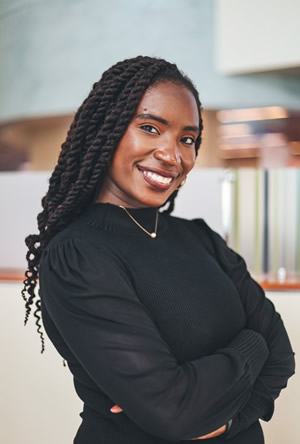Dr. Doreen LuganoWritten by Dr. Monika Witzenberger  Dr. Doreen Lugano is currently a postdoctoral researcher at the University of Texas Medical Branch in Galveston, Texas (USA). Doreen grew up in Kenya and received her undergraduate degree from the University of Nairobi. Thereafter, she moved to the US where she pursued a Master’s degree in Biotechnology at the Florida Institute of Technology. In Dr. Eric Gusibert’s lab she studied the NURF complex in C. elegans and the effects of a NURF complex knockdown in a worm model of Alzheimer’s disease. She continued this project for her PhD studies in Dr. Sandy Westerheide’s lab. She expanded her efforts and started to study the gene CCAR-1 and its role in alternative splicing of genes and germline regulation both in C. elegans and cell culture models. During these projects she extensively employed next generation sequencing tools to investigate differently expressed genes in C. elegans CCAR-1 mutants and changes upon heat shock. Moreover, her preprint showed that CCAR-1 is localized to the germline and participates in DNA-damage induced apoptosis. The next generation sequencing work during her PhD and her passion for infectious disease research drew her to Dr. Routh’s lab. Doreen said, “As an African scientist I was always drawn to infectious diseases, because many of my people are affected by them. Therefore, I was determined to find a postdoc that included both my passions, namely next-generation sequencing and infectious disease research.” Dr. Andrew Routh’s lab uses RNA virus research to establish novel next generation sequencing and bioinformatics tools to study RNA viruses. Doreen’s project focuses on the evolution of RNA viruses, especially during co-infection.
Doreen considers Dr. Routh is an excellent mentor, since he inspires her not only on the scientific but also on a personal level: “He had a lot of influence on me scientifically and towards the trajectory of my career. After our meetings I always feel that he pushes me to achieve two times more than I had planned to do, which I appreciate.” Similarly, she also advises incoming Postdocs to “have a scientific mentor and discuss your future with your supervisor as soon as you start”. To support defining a clear end goal for a career she also suggests participating in career development projects, to network and to start writing grants or fellowships as soon as possible. According to her, establishing collaborations during your PhD and identifying gaps in the literature early on, makes it much easier to find a postdoc position later. However, her greatest personal challenge is being a working mum and balancing her career with raising young children. She believes that no clear, 100% solutions exist for this challenge and that it is always a work in progress to find some form of balance between work and family. Besides her scientific work and family life, she has served as part of the RNA junior scientists committee for the past two years. Putting herself in the shoes of junior scientist and thinking about what would benefit them has influenced how she thinks about her own career. Initially she encountered the RNA junior scientists in her own transition phase from PhD into a postdoc: “During my first RNA society meeting I enjoyed the junior scientist events and especially the networking sessions. This made me want to be involved and contribute to the experiences of other scientist in a transition phase.”
Not only as a member of the RNA junior scientists committee, but also in her home country Kenya, Doreen volunteers to contribute to better accessibility of education and inclusion of African scientists. She works with the diversity and inclusion committee of the RNA society and is involved in an RNA salon in Africa. Moreover, she participates in mentorship projects and has recently launched a platform called Taaluma Talks. Taaluma – which means career in Swahili – Talks are designed for students in Kenya, who want to pursue higher education. She explains that there are a lot of similarities between the undergraduate students in Nairobi and in the US in terms of their curiosity about science. However, in terms of facilities and opportunities such as department speakers, the students in the US have advantages. This opportunity gap needs to be filled in developing countries. “In my department at the University of South Florida, once the seminar speaker was the Nobel Laureate Martin Chalfie, one of the inventors of GFP. The amount of exposure, and proximity to science and accomplished scientists here in the US is unbelievable, and so inspiring. In the future, I hope this can be experienced by scientists in different parts of the world.” In line with her passion for diversity and inclusion, her favorite part of a recent RNA society meeting was Dr. Tracy Johnson’s (a previous spotlight on Dr. Johnson is here) story on this topic. “Her career as an RNA scientist gives me so much hope, she is inspirational!” Doreen’s favorite article in RNA is Professor Mariano Garcia-Blanco’s commentary “Know Thyself”. She can be contacted on LinkedIn and as member of the RNA junior scientists via their email. |
